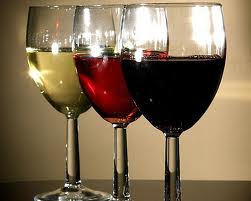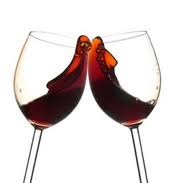Time for Some Wine
Time for some wine… high time in fact.
Reminder about Feedback
This being a subject and a half with many different opinions anchored in the taste buds of the general public, I’m hoping to get some feedback from my lazy readers. I decided to meet the challenge, head on. What wines are good?
By the way, don’t think I haven’t noticed that none of you bother to leave comments. Ever. And yes, I mean YOU.
Nothing makes a writer feel more appreciated than somebody who leaves a note on a blog page or shares a story of their own on a page related to a subject the writer has taken the time to write about. It makes one wonder if you’re really out there, or not?
So I‘m aiming to ruffle a few feathers just to see if I can rouse a lurker or two from the shadows.
Back to the wine....
White, Red or Rosé? Sparkling or not?

Whites
I like dry whites when they stand alone, for drinking without eating, either as an aperitif or for just drinking.
Oh yeah, sometimes wine is just for drinking, so you’ll want it to be good. The best ones for this are from the Loire River valley: the Sancerres, the good quality Muscadet, the Sevre et Loires, the Pouilly Fumés.
Also quite tasty but fruitier and slightly sweeter are the Gewerstraminers (good luck prounouncing that! You’ll have to ask Tanya) from Alsace.
For you of the blatant sweet tooth, there are sickeningly sweet whites from the south west, Bordeaux and such which are quite thick and rather syrupy which must be consumed with dessert or something really rich or they’ll completely overpower your tongue and your food.
There is a well accepted mind set which pairs “foie gras” with Montbazillac every time. This I try to avoid at all costs. I do however have a recipe for a “soupe de fraises au Montbazillac” which is the only way I can tolerate this wine. To my taste buds, its tastes yellow, which mimics a wine which is over done, and almost turned.
Granted, I am not an
“oenologue”, but a high sugar content tends to make me have a wholloping
headache the next morning. It’s a dreadful shame to get sick on something which
is supposed to be a pleasure. Following up an evening drink with a coca cola
for breakfast is always a drag.
Rosés
And where the heck did the term “blush” come in? If blushing is involved you’ve probably already had too much. Is this a ploy to avoid the question of pronunciation?
Rosé is spoken easily, especially after you’ve sampled some… anyway, you say it like this: “row-zay”, and if you’ve already sampled quite a lot it comes out more like this: “ruz-zzzy”. But never fear, waiters in France comprehend drunken wine speak quite well. They’ve become adept at it over the years, since receiving a hefty tip is usually dependent on comprehension. Let’s face it, you leave a tip if you’re served with what you asked for, with a smile and a glass.
But which rosés are the nice ones?
Rosé is widely produced in the deep south of France, in the higher areas just above the Riviera. This area is called “Provence” and the “côtes de Provence” are inexpensive and tasty. This wine is often served in the summer at barbecues, and as such goes well with everything salad-y and grill-able. It’s “ludique” or “fun” as it were. Lighthearted, inexpensive and inextricably linked with outdoor parties. One of the better ones is a “Tavel”.
I also really like certain Bordeaux Rosés which tend to be fruity yet dry. Good combo for me.
Reds

Ahhhhh! Now here’s where I’ll make a few enemies. I’m a snob. I can’t help it.
If a red is cheap, it’s usually bad.
I like Bordeaux reds, the drier the better. Other than reading the tiny print on the label, how do you know a Bordeaux from a Bourgogne for example? The shape of the bottle gives it away. The Bordeaux area consistently uses a bottle with a straight body and stout neck. Bourgognes have a long necked bottle with a large, curvy shaped, fatter body. The content is the same size, both are 75 centiliters, but one gives me a headache the next day, the curvy one.
How do you choose a good Bordeaux? These wines age well. Even “bad years” i.e. not enough sun, or rain, or wind, or good luck, can still age well. So, as a very general, wide-sweeping rule of thumb: the older the better. I kind of like that adage personally, since I believe that certain examples of the human species get better with age as well. Not that I’m specifically speaking of myself, but just in case you didn’t guess, I am. Older, and better at just about everything, except standing on my head, and who cares about that? Although, I do believe that given the correct amount of aged Bordeaux, on any given occasion, I just might be able to give that a try once again.
Cheers!

And don’t forget that when you toast, gently clinking glasses with your fellow drinkers, NEVER, EVER clink then put your glass down without drinking from it! If you do that, it’s like saying “here’s to your health!-not.” I’m weirdly adamant about this. It’s a stupid superstitious thing but still, indulge me on this and have a sip before putting your glass down, d’accord?
Oh, and Champagne will get its own page, because we’ve had an elaborate relationship over the 29 years that we’ve been good friends.
Here’s to you! (and have that sip!)
Return to What About Wine? from Time for Some Wine
Return to France Vacations Made Easy Home Page



